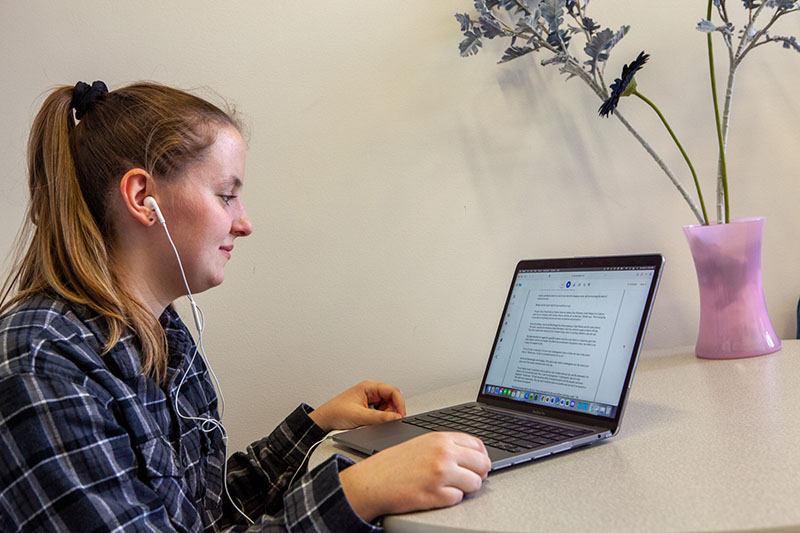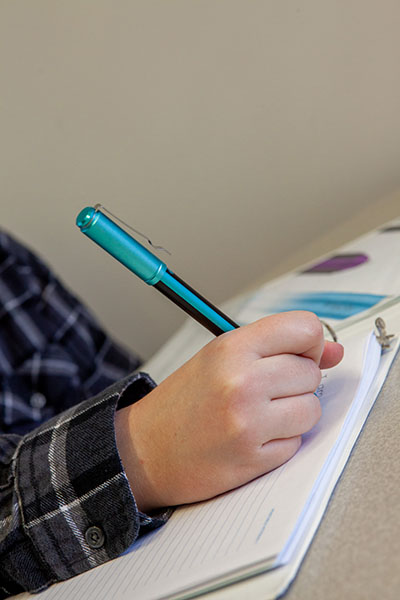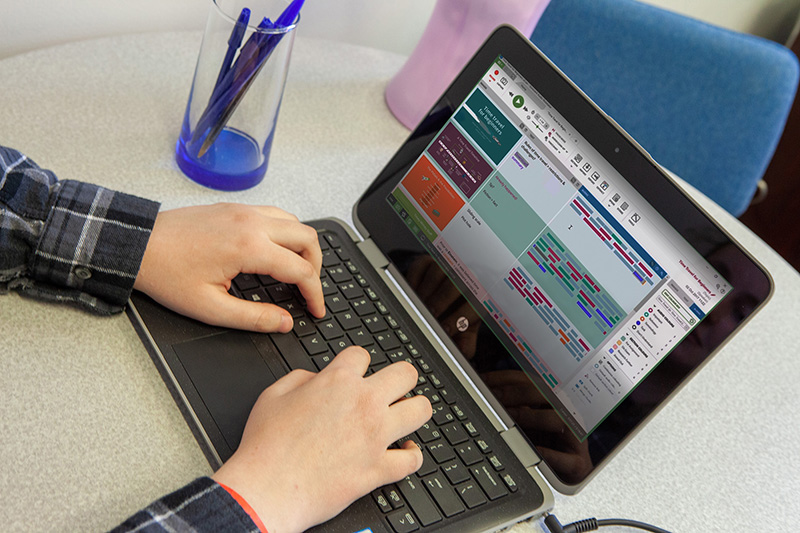- Apply
- Visit
- Request Info
- Give
Office of AccessAbility Services uses technology to enhance learning
Written by Dwight Bachman
Published on March 09, 2022

Students with disabilities face a range of unique challenges in their quest for an education, much more than the usual challenges most college students face. They often lack mentors who understand their challenges. This is especially true with support for adequate reading and study skills, where often the best they get are student helpers assigned to take notes for them.
Eastern Connecticut State University’s Office of AccessAbility Services (OAS) is answering the call with new technologies to help students with disabilities flourish and graduate on time. The new technologies are also available to help other students succeed in their studies.
“SensusAccess” is one of the main technology tools that OAS Director Brooks Scavone and her team are using to support students with disabilities. SensusAccess is a software tool that converts files into alternative formats.
“SensusAccess is available to the entire Eastern community,” said Sandra Flores-Gonzales, OAS’s interim assistant director. “Anyone who has an Eastern email, including alumni, can use it. This is part of a broader initiative to create awareness about digital and print accessibility on our campus. It is our hope that ultimately, all students can transform documents to reinforce their learning styles.

The "smartpen" by Aegir records lectures and enables writing on special dot matrix paper, which can then be listened to later as "pencasts."
“For example, a student may have an assigned reading in the form of a PDF. If that PDF is well designed and constructed, it can be transformed into an audiotext file that students can listen to using a third-party app like Natural Reader, which is free.”
Scavone added, “What is most useful is to know that we are utilizing a variety of websites that offer resources that enable our office to fulfill technology-related accommodations, such as note-taking and audiotext book accommodations. For notetaking, students have an option of using a Smartpen that can record lectures while also recording their written notes. Students write their notes on special paper, which can then be organized afterwards.”
Another option offered is “Sonocent,” which also can record lectures while students type their notes. “Both record in real-time and both allow students to organize their digital files of notes in a way that reinforces their learning preference,” said Flores-Gonzales. “For audiotext book requests, we use Bookshare.org, a website that allows us to assign audiobooks when it’s in their inventory. If not, we go through other processes to acquire a digital book file and make it accessible in an audiotext format.”
The office has also implemented a comprehensive platform system — Accommodate Symplicity — to manage its processes. Accommodate Simplicity also facilitates accommodation requests for students and faculty who can engage with the testing center as appropriate. Faculty also can request training on the portal.
“(SensusAccess) has helped me to convert my course reading materials into formats that fit my studying and learning style,” said senior Taylor Wagner, a psychology major from Waterbury. “One thing I love is that I can convert pdfs of my course readings into an audio book or even into an eBook that I can upload onto my Kindle.”
Cici Sechrist ’23, a women's and gender studies major and president of the Diversability Club, said OAS has resources available not only for students with disabilities but for any student who is struggling with a heavy workload. One of those resources is the OAS Student Support Program (OASSSP).
“The (OASSSP) has student interns who are available to help you with different skills that can help during college, such as social skills, time management skills, study skills and more,” said Sechrist. “They’re always available if you’d like to have a conversation with them, and they are all very friendly.”

Kaitlyn Bower ’22, a senior from Salem majoring in social work, says she has definitely benefited from the technology-related services offered by OAS. “I receive audio textbooks and this accommodation really helped me be successful in my classes. I have a processing disorder so listening to audio books while reading course textbooks really helps me understand the material fully.”
Kai-li Davey ’23, an English major with a concentration in creative writing and a minor in psychology from Southbury, said she has benefited greatly from OAS’s technology services over the past three years.
“As a first-year student, I mainly utilized the SmartPen in my history classes. It allowed me to review the information on my own time and to study for exams outside of class. The audiotexts allowed me the ability to process the information. This helped me greatly, as I am both a visual and auditory learner. If I had a question for my professors, the SmartPen allowed me to write down the information physically and listen to it through my computer. I would then connect with my professors individually if any questions about the material arose."
Scavone says the technology initiative “shows Eastern cares about the greater good and creating positive engagement experiences throughout our community for all students. Our office is promoting a campus culture of inclusivity and trying to create systems of support for the Eastern community to review, improve or remove possible barriers that impact our diverse student population, especially students with disabilities.”
For more information about technology services offered by OAS, contact accessability@easternct.edu .


